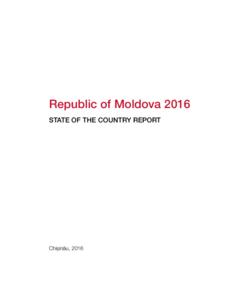
Republic of Moldova 2016: State of the Country Report
The Independent Think-Tank Expert-Grup in partnership with the Friedrich-Ebert-Stiftung is launching today, the 30th of September, in the framework of the 4th Edition of the Annual International Conference MACRO 2016, the State of the Country Report 2016.
The experts ascertain that the Republic of Moldova, at her early age of 25th years of independence, is confronting one of the most acute crises in its short history. After the economic, currency and banking shocks of 2015–2016, Moldova has become more vulnerable than ever, entering a period of anemic economic growth, which could last for at least five years. Besides the external constraints, the fundamental cause aggravating Moldova’s economic condition is related to major governance failures in the recent years, intensified by the “brain-drain” phenomenon.
The International MACRO Conference 2016 provides a high-level intellectual platform for debate between the key actors. The 4th edition of the conference hosts 13 speakers from 5 countries: Georgia, Armenia, France, Romania and Moldova and over 100 participants, including political leaders, policy makers, representatives of local governments and the private sector, local and foreign experts, representatives of CSOs and academia in Moldova.
The “Moldova 2016 State of the Country Report” provides analytical support for the discussions within the MACRO Conference, especially in what concerns the financial sector, the social sector and the human capital, as an instrument to restore Moldova’s competitive advantage.
The main conclusions of the State of the Country Report are as follows:
- After the economic, currency and banking shocks of 2015–2016, Moldova has become more vulnerable than ever. Although the authorities have kept the country afloat and managed to dodge a systemic catastrophe, the Republic of Moldova no longer has a safety airbag of the kind that cushioned the 2015–2016 shocks. Therefore, the case of the “stolen billion” is not related only to the decapitalization and failure of three important banks, the meltdown by about one-third of foreign ex-change reserves and an increase of the state debt, but also it significantly affected the country’s economic and financial security, which has made Moldova more vulnerable to a wide range of fiscal, currency and social shocks.
- The governance incapacity to prevent bank frauds and the billing of the cost of these frauds to its citizens aggravate the omnipresent perception of endemic corruption and state capture by obscure interests.
- The growing distance between the Government and the society can be easily observed. This is revealed by the increasing mismatch between the Government discourse and the perceptions of the population. For instance, the Government has reported that the first Millennium Development Goal (eradicate extreme poverty and hunger) has been achieved, but according to the perception of the population the level of poverty has increased over the last 10 years. At present, 42% of the population are worried about poverty, 37% of Moldovan families regard themselves as poor, and 41% believe that their income is enough only to cover their basic needs. As a result, the majority of the population does not trust the Government, which, amid the difficult economic conditions, fuels strong incentives for tax evasion – an issue that is especially acute nowadays, given the fact that it is planned for the budgetary deficit to exceed the threshold of 3% of GDP in 2016.
- The State of the Country Report ascertains that Moldova’s economic growth is anemic; this has mainly been caused by decreasing consumption, whereas no alternative sustainable sources of growth (exports and investments) have been activated yet. The transition to a new economic growth model is even more cumbersome given that the country’s reputation will remain tarnished for a long period in the eyes of foreign and local investors. The considerable increase in the out-migration of highly educated persons – a trend that has recently become more visible – will also harm even more the competitiveness of the Moldovan economy, depriving it not only of labor force, but also of human capital. In this context, we expect GDP to grow only by an average of 1%–3% in the coming years. While this could be an acceptable level for developed countries, this is considered to be very low for Moldova, which needs to grow by about 7%–8% to catch up with the countries in the region within a reasonable period of time.
- On the positive side, the confidence crisis in public institutions can be turned into an opportunity for a Government that is willing to revolutionize the governing mechanism.Under such circumstances, the population expects the Government to implement real reforms and revolutionary measures – no exaggeration is implied. This can present a real opportunity for the Government in proving that it can be different from the previous governments (in a good sense).
- In this context, the experts recommend focusing on four areas of reform: enabling the private sector; reforming the economic policy model, which will encourage investment, exports and innovation; reforming the public administration, as well as the financial sector.